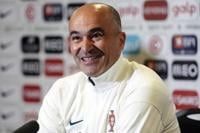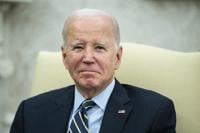The question was inevitable.
At his first news conference as Thomas Tuchel – a German – was asked on Wednesday what message he had for fans who would have preferred an Englishman in charge of their beloved national team.
“I’m sorry, I just have a German passport,” he said, laughing, and went on to profess his love for English football and the country itself. “I will do everything to show respect to this role and to this country.”
The soccer rivalry between England and Germany runs deep and it’s likely Tuchel’s passport will be used against him if he doesn’t deliver results for a nation that hasn’t lifted a men’s trophy since 1966. But his appointment as England’s third foreign coach shows that, increasingly, even the top countries in the sport are abandoning the long-held belief that the national team must be led by one of their own.
Four of the top nine teams in the FIFA world rankings now have foreign coaches. Even in Germany, a four-time World Cup winner which has never had a foreign coach, candidates such as Dutchman Louis van Gaal and Austrian Oliver Glasner were considered serious contenders for the top job before the country’s soccer federation last year settled on Julian Nagelsmann, who is German.
“The coaching methods are universal and there for everyone to apply,” said German soccer researcher and , whose recent book “Crossing the Line?” historically addresses Anglo-German rivalry. “It’s more the personality that counts and not the nationality. You could be a great coach, and work with a group of players who aren’t perceptive enough to get your methods.”
Not everyone agrees.
English soccer author and journalist Jonathan Wilson said it was “an admission of failure” for a major soccer nation to have a coach from a different country.
“Personally, I think it should be the best of one country versus the best of another country, and that would probably extend to coaches as well as players,” said Wilson, whose books include “Inverting The Pyramid: The History of Football Tactics.”
“To say we can’t find anyone in our country who is good enough to coach our players,” he said, “I think there is something slightly embarrassing, slightly distasteful about that.”
That sentiment was echoed by British tabloid The Daily Mail, which reported on Tuchel’s appointment with the provocative headline “A Dark Day for England.”
While foreign coaches are often found in smaller countries and those further down the world rankings, they are still a rarity among the traditional powers of the game. Italy, another four-time world champion, has only had Italians in charge. All of Spain’s coaches in its modern-day history have been Spanish nationals. Five-time World Cup winner Brazil has had only Brazilians in charge since 1965, and two-time world champion France only Frenchmen since 1975.
And it remains the case that every World Cup-winning team, since the first tournament in 1930, has been coached by a native of that country. The situation is similar for the women’s World Cup, which has never been won by a team with a foreign coach, though Jill Ellis, who led the U.S. to two trophies, is a naturalized U.S. citizen born in England.
Some coaches have made a career out of jumping from one national team to the next. Lars Lagerbäck, 76, coached his native Sweden between 2000-09 and went on to lead the national teams of Nigeria, Iceland and Norway.
"I couldn’t say I felt any big difference,” Lagerbäck told The Associated Press. “I felt they were my teams and the people’s teams.”
For Lagerbäck, the obvious disadvantages of coaching a foreign country were any language difficulties and having to adapt to a new culture, which he particularly felt during his brief time with Nigeria in 2010 when he led the African country at the World Cup.
Otherwise, he said, “it depends on the results” — and Lagerbäck is remembered with fondness in Iceland, especially, after leading the country to Euro 2016 for its first ever international tournament, where it knocked out England in the round of 16.
Lagerbäck pointed to the strong education and sheer number of coaches available in soccer powers like Spain and Italy to explain why they haven’t needed to turn to an overseas coach. At this year’s European Championship, five of the coaches were from Italy and the winning coach was Luis de la Fuente, who was promoted to Spain’s senior team after being in charge of the youth teams.
Portugal for the first time looked outside its own borders or Brazil, with which it has historical ties, when it appointed Spaniard Roberto Martinez as national team coach last year. Also last year, Brazil tried — and ultimately failed — to court Real Madrid’s Italian coach Carlo Ancelotti, with Brazilian soccer federation president Ednaldo Rodrigues saying: “It doesn’t matter if it’s a foreigner or a Brazilian, there’s no prejudice about the nationality."
The United States has had a long list of foreign coaches before , the Argentine former Chelsea manager who took over as the men’s head coach this year.
The English Football Association certainly had no qualms making Tuchel the national team’s third foreign-born coach, after Swede Sven-Goran Eriksson (2001-06) and Italian Fabio Capello (2008-12), simply believing he was the best available coach on the market.
Unlike Eriksson and Capello, Tuchel at least had previous experience of working in English soccer — he won the Champions League in an 18-month spell with Chelsea — and he also speaks better English.
That won’t satisfy all the nay-sayers, though.
“Hopefully I can convince them and show them and prove to them that I’m proud to be the English manager,” Tuchel said.
___
AP Sports Writer Jerome Pugmire in Paris contributed to this story.
___
AP soccer:








































